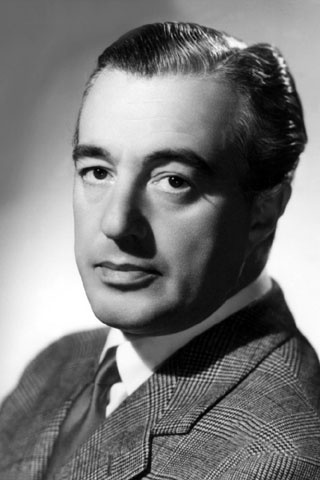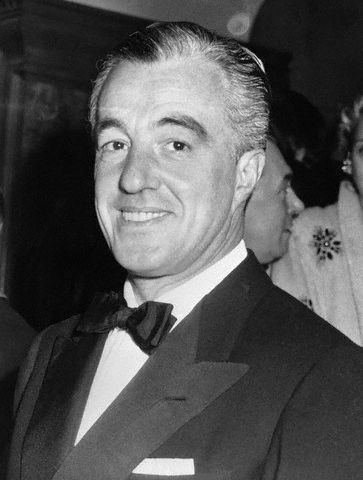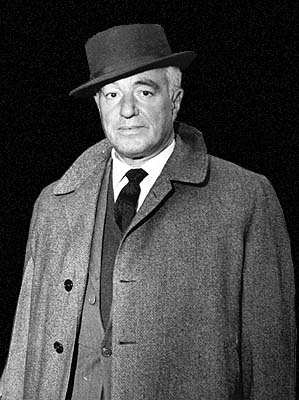<Back to Index>
- Director Vittorio De Sica, 1901
PAGE SPONSOR



Vittorio De Sica (7 July 1901 or 1902 – 13 November 1974) was an Italian director and actor, a leading figure in the neorealist movement.
In his career, four of the films he directed won Academy Awards: Sciuscià and Ladri di biciclette were awarded honorary Oscars, while ieri, oggi, domani and Il giardino dei Finzi Contini won the Best Foreign Language Film Oscar. Indeed, the great critical success of Sciuscià (the first foreign film to be so recognized by the Academy of Motion Picture Arts and Sciences) and Ladri di biciclette helped establish the permanent Best Foreign Film Oscar. These two films generally are considered part of the canon of classic cinema. Ladri di biciclette was cited by Turner Classic Movies as one of the 15 most influential films in cinema history.
Ironically, for an artist considered one of the Italian cinema's greatest and most influential directors, De Sica's sole Academy Award nomination was for acting, when he received a Best Supporting Actor Oscar nod for playing Major Rinaldi in American director Charles Vidor's 1957 adaptation of Ernest Hemingway's A Farewell to Arms, a movie that was panned by critics and proved a box office flop. De Sica's acting was considered the highlight of the film.
Born into poverty in Sora, Lazio (in either 1901 or 1902 - sources are divided), he began his career as a theater actor in the early 1920s and joined Tatiana Pavlova's theater company in 1923. In 1933 he founded his own company with his wife Giuditta Rissone and Sergio Tofano. The company performed mostly light comedies, but they also staged plays by Beaumarchais and worked with famous directors like Luchino Visconti.
His meeting with Cesare Zavattini was a very important event: together they created some of the most celebrated films of the neorealistic age, like Sciuscià (Shoeshine) and Ladri di biciclette (Bicycle Thieves, released as The Bicycle Thief in the U.S.A.), both of which De Sica directed.
De Sica appeared in the British television series The Four Just Men (1959).
His passion for gambling was well known. Because of it, he often lost large sums of money and accepted work that might not otherwise have interested him. He never kept his gambling a secret from anyone; in fact, he projected it on characters in his own movies, like Count Max (which he acted in but did not direct) and The Gold of Naples.
In 1937 he married Giuditta Rissone, whom he met ten years before and who gave birth to his daughter, Emi. In 1942, on the set of Un garibaldino al convento, he met Spanish actress Maria Mercader (sister of Ramon Mercader, Trotsky's assassin), with whom he started a relationship.
He was a Roman Catholic.
After divorcing Rissone in Mexico in 1954, he married Mercader in 1959, again in Mexico, but this union was not considered valid under Italian law. In 1968 he obtained French citizenship and married Mercader in Paris. Meanwhile he had already had two sons with her: Manuel, in 1949, a musician, and Christian, in 1951, who would follow his father's path as an actor and director.
Although divorced, De Sica never parted from his first family. He led a double family life, with double celebrations on holidays. It is said that, on Christmas and New Year's Eve, for example, he used to put back the clocks by two hours in Mercader's house so that he could make a toast at midnight with both families. His first wife agreed to keep up the facade of a marriage so as not to leave her daughter without a father.
Vittorio De Sica died at 73 after a surgery at the Neuilly - sur - Seine hospital in Paris.
"There is no crisis in cinema. There are negative periods. There are times when some films are received well and others aren't. The past teaches us that some films were received badly, while others go sailing on. There are two films doing very well right now in the Italian market: One is Il gattopardo, which earns seven million lire a day, and the other is Il diavolo, starring Sordi, which earns 3 1/2 million. So there are films that are doing very well. What I notice is that producers have been known to make errors in judgment, which have caused them to be overly daring. For example, I've been told many millions were spent, somewhere around half a billion, for a film entrusted to a young person. We must make room for young people, but with half a billion we could have made eight of Ladri di biciclett. Experimental cinema should be inexpensive cinema. Half a billion lire should be entrusted to those professionals who we can be sure will bring home the half billion spent. We should be cautious with new initiatives. Producers should be cautious. As for television as a competitor, yes, there I see a danger. Let television do television, let them do documentaries, but cinema as such should be shown on screens, because there's no one more lazy than the public. When people don't have to leave their homes, they're very happy. A film shown in the home encourages the audience not to budge."